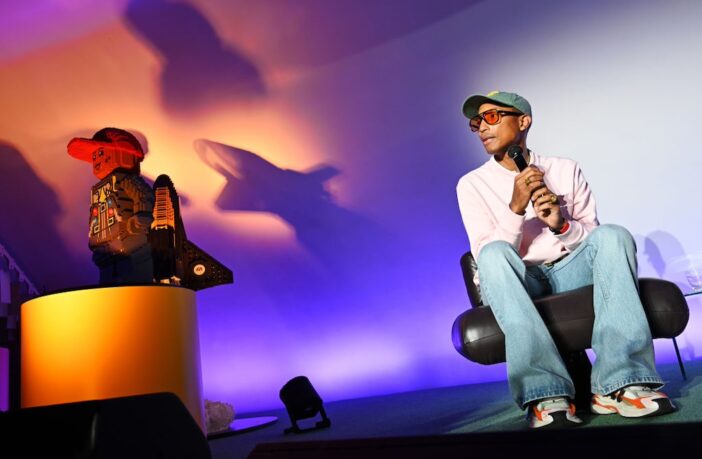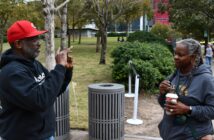Pharrell Williams has long been a visionary, constantly redefining the boundaries of creativity, and his latest venture only solidifies that legacy. In a bold and unexpected move, Pharrell has chosen to narrate his life story through the lens of LEGO—a nod to the playful, imaginative spirit that has marked his journey. Raised in the Atlantis Apartments, a public housing project in Virginia Beach, the multi-hyphenate initially saw nothing extraordinary about his upbringing. Yet, his evolution into a musical powerhouse—collaborating with heavyweights like Beyoncé, JAY-Z, Kelis, Kendrick Lamar, Justin Timberlake, and Snoop Dogg—speaks volumes about his far-reaching influence and the impact of his artistic vision.
Directed by Academy Award-winner Morgan Neville, Piece by Piece brings Pharrell’s story to life in a playful yet powerful way. The animated film uses LEGO to trace his early life as a young boy with a boundless imagination and a passion for music. Viewers are taken on a vibrant, imaginative journey that follows his evolution from a dreamer in the projects to a Grammy-winning producer, songwriter and performer who has shaped the sound of multiple generations. Starring an impressive list of superstar cast members like Missy Elliott, Timbaland, Busta Rhymes, Gwen Stefani, Pusha T, and others, the film offers a unique glimpse into Pharrell’s creative mind, showing the behind-the-scenes moments that helped mold him into a global icon.
Ahead of the film’s highly anticipated release in theaters, Friday, Oct. 11, EBONY caught up with Pharrell to talk about his creative process, the inspiration behind the film, and his unique ability to see music in color. As always, Pharrell left us with some words of wisdom—because no conversation with him is complete without a little inspiration.
EBONY: What made you decide to use LEGO as the way to share your story?
Pharrell Williams: So it was a resort. I resorted to doing that because I didn’t wanna do a documentary on my life ’cause I thought it was boring. I’m only motivated by doing things that I’m curious about. That’s what motivates me, and I’m not curious about myself. If you go look at yourself in the mirror right now, are you curious? No. You had a couple goals or things you wanna do, maybe, but like you are, you’re not curious about what you did yesterday. You’re not curious about what you did two years ago. You know. In fact, you’re probably tired of talking about it. So I’m like, ‘Man, last thing I want to do is do that or like listen to myself talk.’ Like, do you like listening to yourself on voicemail?
I’m a journalist and most of the time I don’t like listening to my interviews once I hear my voice.
Right? So imagine an hour of it. You’re gonna be like, “No, I don’t wanna do that.” So I was like, “No, no, no, no, no, no, no.” Then finally, my agent was like, “Yo, you can do it whatever way you want, bro. Just come on.” And I was like, “huh.” Basically, I wouldn’t have to do a project that was centered around reflection, but it could be a project around that. That’s more like an opportunity to be creative. I could just do something different. First of all, I pride myself in like collaborating with like the top of the top, best of the best, and when I collaborate, I try to work with people way smarter than me and way better than me. And that’s where Morgan [Neville] comes in because he’s such a masterful storyteller. It’s gonna be great. I’m like, “Man, I would give autonomy to that guy. I would let him tell my story. I would let him have autonomy to the music. Just let him do whatever he’s gotta do to tell the story, whatever way he saw fit.” And so then it was like, “Okay, that’s who would tell the story, but it still needs to be different.” That’s when I thought about my earliest childhood memories of my toys being LEGO sets, and for my own kids, we get them LEGO sets. Then, I get to tell my story in a way that my kids can receive it as soon as it’s done.
When did you first realize that telling your story was something you needed to do?
No, I never felt that way. No, no, no, no. Because I didn’t find my story interesting, I’m from Virginia. It’s not like I’m from New York or from Los Angeles or some of these other places that you think of when you think of like really interesting, deeper stories. You think of Houston, or you think about Atlanta. But if we told it through LEGO, it could be vivid and beautiful. That’s when I was like, “Oh, okay, cool.” But it was never really about my story. Like I told you in the very beginning, I didn’t think there was anything interesting about my story.
After watching it, do you still feel like your life isn’t that interesting? Because I have to say I completely disagree.
As we were going through and I started talking about my transformation, I realized how I had changed my outlook, and I changed my disposition. I went from being full of hubris to like humble and like wanting to be about humility. That’s when I was like, “Okay, now my story could be of service to others.” People could actually get something from it. Because before, it was like, “Well, what’s the through line? Like, who gives a s**t?” Like, where I’m from? And how I got on? You go to Wikipedia, there you go. But, if I can communicate to people about my journey from hubris to humility, then we got something.
When it came time to reflect on the moments where you felt like your career was heading downhill, was it hard to tell that part of your story? How did you navigate sharing those tougher experiences in the film?
I don’t know. I just told it. It’s just what happens. It’s ebb and flow for everybody. Sometimes, you put out music. Sometimes you don’t.
You also talked about your synesthesia in the film. Can you explain how you experience sound as color? What’s that process like for you when you’re creating music?
It’s hard to communicate because what you see in your mind’s eye is subjective. But the greatest way that I can explain it is like thinking about like a red dot. It’s not the shape of the dot that you see in your mind’s eye. It’s the space that fills in the dot. And that’s how I hear colors of music. I hear the space of the colors, not a shape.
This movie really opened my eyes to how much you’ve shaped the sound of so many superstars’ careers. Can you talk a bit about your role behind the scenes, and how it feels to have contributed to so many hits, sometimes in ways people may not even realize?
I think that they’re all big parts of my life, actually. They helped me. These people changed my life. They gave me opportunities to make music, and I’m so grateful.
How did cast members like Snoop Dogg, Kendrick Lamar, and even JAY-Z react when they found out the documentary would be told through LEGO? Were they surprised by the unique concept, or did they immediately get on board with the creative vision?
Nah, we didn’t mention the LEGO part. We just told ‘em it was gonna be an animated doc. They trusted me and they were all down. Just to be involved with the project, I’m just so honored. I really am.
Thanks so much for your time, Pharrell. It’s been an absolute pleasure talking with you!
No, I appreciate you. And listen, man, whatever your fears, your flaws, your insecurities, you know the guilt that you may feel sometimes, you know, ’cause people guilt bully all the time. All the pressure, let it all go. Liberate yourself, set yourself free. There’s no feeling like it, man. Things will never be perfect. But man, set yourself free. All those things are holding you back. Your insecurities are your captors. They’re colonizing your mind. They’re colonizing your future. Set yourself free. They’re enslaving you. Let those things go. Your insecurities are enslaving, let ’em go.



